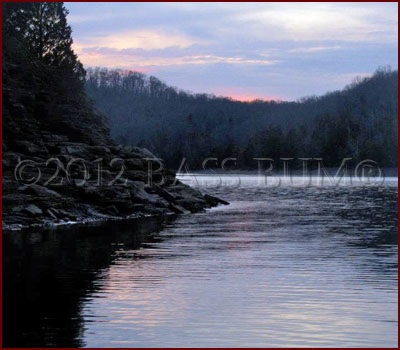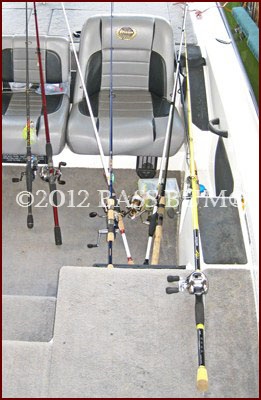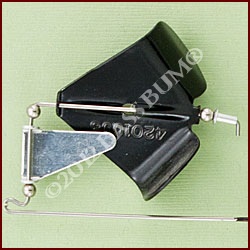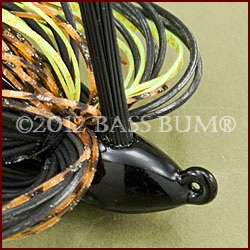Fishing In The Dark
Night Bass Fishing Tips
The Activity of Bass Increases After Dark
Fishing in the dark, when the water temperature is consistently 70° or higher, will magnify your chances of landing not only more bass, but larger bass. Don't wait till it's completely dark. Start as the sun is dropping towards the horizon. While night fishing is engaged in more in the southern half of our country, where there are highland reservoirs and "hot" summers, it is productive anywhere.
It is well established that upwards of 90% of all fish, not just bass, feed predominantly, though not exclusively, at night. This is true regardless of season by the way. While there are many studies that confirm that while water temperature, the clarity of the water and even the amount of daytime activity there is on a lake impact when bass choose to feed, the following summer feeding patterns for bass turn on water temperature:
- Surface temperature reaches 70° and stays there around 50% of active feeding occurs at night.
- Surface temperature reaches 80° around 75% of active feeding occurs at night.
- Surface temperature reaches 90° virtually 90% of active feeding occurs at night.
Biologists tell us that bass feed somewhere around 10 hours of every 24. So the math tells us they will be feeding 8-9 hours each night. The fact that bigger bass, the more cautious bass, feed more after dark is also well established.

You don't have to poke me in the butt with a hot poker. The above stats provide reason alone for fishing in the dark. But in summer there are numerous others for you to venture out on the water after dark. Besides the chance to catch more and possibly bigger bass consider the following. Cooler temperature, no personal water craft (jet skis) or ski boats, calm water, quiet and the embrace of darkness as soft as your lovers arms.

A Night Fishing Tip or Two
Fishing Safety Comes First When Night Fishing for Bass
There are far too many bass fishermen who have underestimated the inherent dangers of being on the water in a boat and paid for it with injury or death, to themselves or others. There are many dangers when it's daylight. Fishing in the dark magnifies them threefold. The following are some areas you best give attention before an evening of night bass fishing.
Familiarity With Water Being Fished
If you have spots that have proven productive during daylight fishing you're better off to limit your night fishing to those as well.
"Slow" Is The Keyword
If you have never been fishing in the dark the first time out you will likely be stunned by how difficult it is to get your bearings. Even on water you've fished many times before. So, you'll be wise to limit yourself to areas you know produce fish and which are close to your launch point. You go hauling ass across the lake in the dark you're being reckless to yourself and any others that may be out.
Move slowly to your chosen spot. Really, max should be no faster than you would travel in a no wake zone.
This should be obvious but wear a PFD at all times when night bass fishing.
Be Visible To Other Boats
Running lights are not only legally required but essential if you wish not to be run over by some other angler that doesn't see you stumbling around in the dark. I also carry a spot light that can be plugged into the console. It's come in handy more times than I can count.
Food for thought. My personal experience tells me running lights have as their main purpose in life that of irritating the snot out those who enjoy fishing in the dark. More times than not they don't work. I carry extras. This falls into the "what if" list referred to below.
Be Prepared With the Right Gear
Make a list of those things you will need. First include those things that will contribute to your time on the water being as hassle free as possible. Secondly, make a "what if" list. Remember Murphy's Law. "If anything can go wrong, it will".

Reduce The Number of Rods and Lures
I'm one of those guys that won't go out in daytime with less than ten rods on deck. I also have enough lures on hand to sink the boat. Yes, maybe it's overdoing it. And yes, sometimes my fishing partners joke (a nice way of saying bitch) about it. But it's how I like to fish.
Anyway, when I'm night bass fishing I adhere to the rule of no more than three rods and only those select lures I need. Believe me, it makes night fishing for bass a whole lot more hassle free and immensely more safe.
In the photo right I see eight. I have two more on the deck. Do not have this many when fishing in the dark. It's a recipe for disaster.

Is There A Best Fishing Time During The Night?
As with all things bass fishing there are no hard and fast rules but generally speaking the last hour of light, dusk, into the first hour of darkness then during the midnight to dawn hours are the most productive. Remember, this is but a general rule of thumb when fishing in the dark.
After the first hour of darkness the bass that have been feeding shallow close to home tend to move about so are a bit more difficult to find. However, as dawn approaches bass will move to shallow water again to feed-up before heading out to deeper water when the water warms up and the people become active.
Where Do You Go When Fishing In The Dark?
When fishing in the dark start by going where you have caught bass during daylight. They'll be there at night only joined by some of their bigger sisters. Telemetry studies show most bass don't travel far from their home territory. During the day they'll hunker down close to cover in water 25' or deeper. You've probably been sitting on top of them or between them and the shore all day while fishing the shallow water. However, come dark they move shallow to feed.
So try spots where a creek drops into the main channel. If there is grass there too, bingo! Cuts that have a runoff and cover are high percentage spots. Long gradually sloping points are famous for producing bigger than average bass at night. A tapering point that drops off on either side is primo. The always enticing flats are good locations too.
Don't overlook docks for largemouth, especially if lighted.
Any of these places that are close to deeper water ledges and drop-offs are good prospects.

Night Bass Fishing Tackle and Lures
Clear the deck! Leave little out that you could trip over. Three rods including spinning and casting rigs is max for me. Keep what lures you plan to use close at hand in a small bag but out of the way.

Fishing in the Dark - Lures to use? Darkness calls for spinnerbaits (great for smallmouth) with Colorado blades first and foremost if you're fishing clear water lakes, topwater lures (Jitterbugs, buzzbaits), big jigs like a Buckeye Mop Jig shallow around grass and broken scattered rock along the shore, "big" soft plastics for shallow cover or deep grass beds. Some anglers will use medium diving crankbaits.
Getting hung up anytime is a pain in the backside. At night it's torture. No matter what you chose fish 'em slow with a steady retrieve.

Fishing in the Dark - Lure colors that produce? Traditional thought is to use black lures no matter what they are. That's fine of course but other darker colors a suitable. Remember, color fades as water deepens and the reduced light penetration after dark accelerates this. You're wanting to present a "contrast" and silhouette against the background. Check out our page on fishing line color for an explanation about colors and the effect water depth and clarity has on them.
Lures that make sound are a plus for fishing after dark. Bass are primarily sight feeders but noise will help them locate your lure at night. That's why jerkbaits are not the best idea. You will expend a lot of energy for little to no reward.
Best Weather Conditions?
Fishing after dark will be be the most enjoyable on clear water lakes when the surface is calm to flat and there is very little moonlight. On clear moonlit nights bass will likely venture into deeper water as it will enable them to see better and feed there. On darker nights bass will have to depend more on their other senses so the speed of your lure, its color contrast and any noise it makes will draw them before they see the lure.
Now for you moon watchers out there I'm not talking about the moon influence theory. I mean it's better if there is actually little light regardless of the moon cycle. The brighter it is the better bass see. Remember they're sight feeders so if visibility is good they're likely to "feed up" in deeper water before you drop your lure in their face.
Night Bass Fishing Safety - Ignore It At Your own Risk
The Bass Bum Four "S" of Night Bass Fishing Lures
Return to Bass Fishing and Catching from Fishing In the Dark
